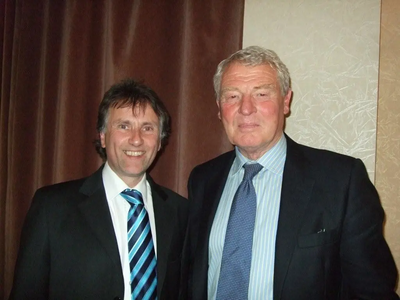A personal tribute to Paddy Ashdown
A Tribute to Paddy Ashdown
Wealden Liberal Democrats' parliamentary
spokesperson Chris Bowers, who knew Lord Ashdown,
pays this tribute to the former Lib Dem leader,
who has died of bladder cancer and pneumonia aged 77:
It's easy to say Paddy Ashdown built the Liberal
Democrats, and it's true. But people forget that
before he could build the party, he had to save
it. And to do that, two acts of the soldier's courage
stand out.
When the Liberal Party and the Social Democrats
merged after the 1987 general election, it made
sense in that there was clearly insufficient room
in the centre ground for both. But merging a
traditional party boasting a well entrenched
election-fighting structure with a new party
whose leaders had broken away from government was
far from easy, and the party's fortunes
plummeted. The nadir was the European Parliament
elections of 1989 when the Lib Dems polled just
6%, eclipsed by the Greens' national figure of
15% which suggested the liberal tradition was on
its way out.
But in 1990 Ashdown did two things. Firstly he
stood up in the House of Commons, facing the
braying and mockery of Labour and Conservative
MPs, and made the case that all residents of Hong
Kong should be offered British passports. It was
an unpopular suggestion as there was a wave of
anti-immigrant sentiment at the time (sound
familiar?), but it was the right thing to do. And
even those who disagreed with him admired his
stance. It established the Lib Dems as a party
that spoke truth to power, whether or not you
agreed with it.
Secondly, he was instrumental in the party
fighting and then winning the 1990 Eastbourne
by-election caused when Irish republican
terrorists blew up the sitting Conservative MP
Ian Gow. Some in the Lib Dems didn't want to
fight the by-election out of respect for the way
Gow had been assassinated, but Ashdown said
democracy would be further injured by a failure
to contest the seat. He spent most of the
campaign in Eastbourne, and saw the party to
a memorable victory.
The Lib Dems lost the seat at the 1992 election,
but the by-election win had given the party some
momentum, and the total number of Lib Dems in
1992 went up to 20. Five years later Ashdown saw
the total rise to 46.
Had Labour's victory at that 1997 election not
been so massive, Ashdown may well have been part
of the government, as he worked very closely with
Tony Blair from 1995 onwards on what became known
as 'the Ashdown-Blair project'. Even if he hadn't
become a minister, we could well have a
proportional voting system by now, but Blair
couldn't get this through, and by 1999 Ashdown
felt he'd done as much as he could and retired as
Lib Dem leader after nearly 12 years.
I interviewed him in 2010 for my biography of
Nick Clegg, as he saw Clegg very much as his
protégé. He told me he saw himself as 'the
grandfather of the Liberal Democrats', and when
he first met Clegg in 1997 he knew this was a
young man destined for greatness. But he was
nervous about the coalition, feeling that it was
justified only because the coalition agreement
meant a lot of Lib Dem polices would come to
fruition. As he said on the Today programme the day
after polling day in the 2010 general election:

"The electorate has created an excruciating
instrument of torture for us Liberal Democrats -
our hearts went one way, but the mathematics went
the other." His nervousness over the
electoral consequences was proved accurate in the
drubbing the party took at the 2015 election.
As an indefatigable man of boundless energy -
many have described his death has a shock because
he always seemed indestructible - he could have
his infuriating sides. He didn't suffer fools
gladly, he was impatient, and in private his
language never lost the colourful vocabulary of
his military days. One of his nicknames was
'Action Man', and it referred to him as much
in politics as in the jungle.
In his latter years, he would often return to
East Sussex, particularly Eastbourne, to make the
case for the party and what it believed in. He
would often use the same anecdote: 'You know, I
was walking through Victoria station on my way
here when someone stopped me and said "Didn't you
used to be Paddy Ashdown?"' as it always got a
hearty laugh. But even as Lord Ashdown of
Norton-sub-Hamdon, he never stopped being Paddy Ashdown.
